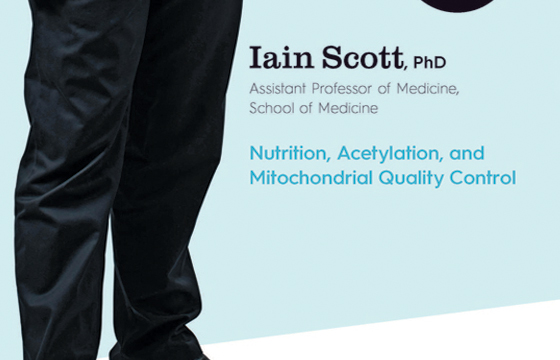Topic Overview:
Mitochondria are ubiquitous organelles, playing a vital role in bioenergetics, metabolite biosynthesis, and overall cellular homeostasis. Their functional activity needs to be tightly regulated, as shown by the growing number of pathologies in which mitochondrial dysfunction is recognized as either a causative or compounding factor. Mitochondria are highly susceptible to environmental stresses, with over-nutrition being a particular problem in the developed world. A high-caloric intake leads to a surge in available acetyl-CoA (the final breakdown product of fats, carbohydrates, and proteins in the mitochondria), which cannot be efficiently used for energetic or synthetic purposes. This excess acetyl-CoA can instead be used as the substrate for acetylation (a post-translational modification of lysine residues), which acts to reduce the activity of a vast number of mitochondrial metabolic enzymes. Scott’s work focuses on the intrinsic mechanisms that regulate mitochondrial protein acetylation and how this fundamental alteration affects organelle function at the cellular and tissue levels. In particular, Scott is interested in the coordination between acetylation levels and mitophagy, a quality-control mechanism that mediates the removal of dysfunctional mitochondrial organelles. Scott and colleagues have recently discovered that GCN5L1, a mitochondrial protein that promotes lysine acetylation, regulates the transcriptional machinery of mitophagy. Future work will aim to elucidate the pathways that link nutritional inputs, GCN5L1-mediated lysine acetylation, and mitochondrial quality-control systems. These findings will then be translated into studies involving metabolically relevant disease models like heart failure and diabetes in order to achieve a better understanding of the role played by dysfunctional mitochondria in these processes.

















